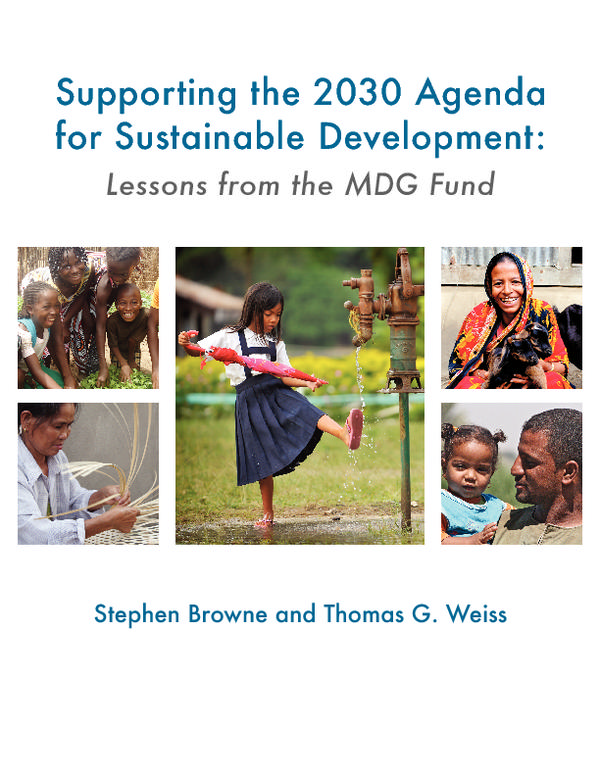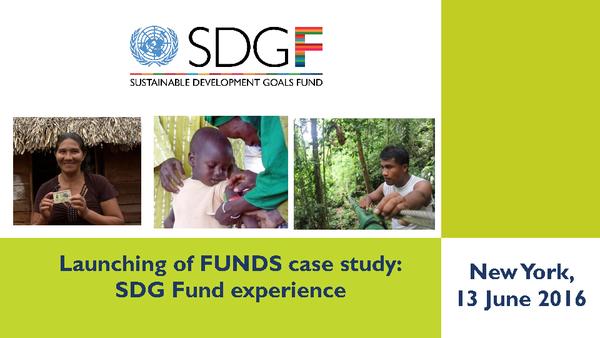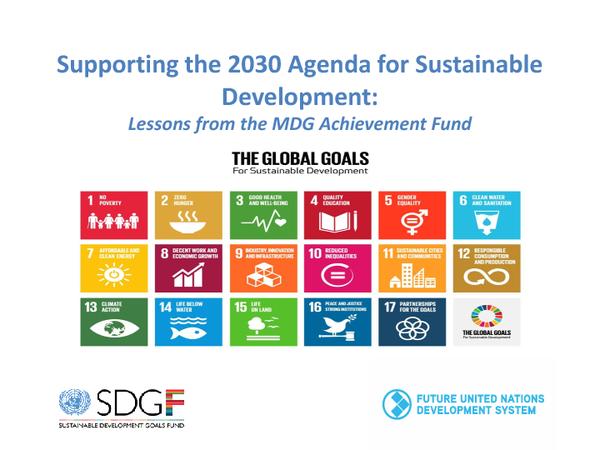June 13, 2016
Learning from the MDG Fund experience
On Monday June 13, 2016 the Future of the United Nations Development System at CUNY Graduate Center launched a report on the lessons learned from the MDG Fund. This report has been commissioned with the aim of becoming a window into the future of development, particularly into what the Sustainable Development Goals may represent. The SDG Fund is a multi-donor development mechanism, inspired by the broader principles of the Millennium Development Goals Achievement Fund, which could serve as a platform for interagency and multi-partner collaboration in pursuing the SDGs. The particularities of the SDGs required a new framework of action and the SDG Fund was adapted accordingly to deliver more effectively in this new context.
The SDG Fund is already working in 21 countries through joint programmes with 14 UN Agencies in all regions with the premise that the 2030 Agenda requires a completely new understanding of responsibilities and potential contributions of development actors, many of whom are relatively new to development or at least to the UN Development System.
The new Sustainable Development Goals are substantially different in many ways from the Millennium Development Goals (MDGs) including a new focus on universality, the clear understanding that development can only be effective when it incorporates the three dimensions of sustainable development (economic, social and environmental) and the realization of a new geopolitical order in the development landscape, with new actors and priorities.
The premise of this report is that the vast experience of the MDGs can greatly inform and provide lessons learned for more effective implementation of the 2030 Agenda for Sustainable Development, which was approved in September 2015. The MDG Achievement Fund provides a unique opportunity to look into the process that helped to achieve the MDGs.
With joint programmes in 50 countries in eight broad thematic priority areas, as this report by FUNDS affirms, the MDG Fund was one of the boldest attempts to put the UN System into action to deliver development goals. In this report, devised as a case study of the experience, the authors highlight some of the strengths (and some weaknesses) of this mechanism.
In this report, the authors give suggestions for rethinking the UN role in the SDGs. For example three elements which can provide a glimpse into the SDG Fund:
In order for a fund to contribute to the ambition of the new agenda, the first priority is to ensure the participation of all actors, starting with greater national ownership. All SDG Fund joint programmes are designed, approved, and implemented with national governments, which also participate in their steering organs. At the same time, national partners contribute matching funds with their own resources. At the time of publishing, more than 20 countries are contributing approximately 55% of programme budgets. More importantly, 25% of total resources come from non-DAC countries, reflecting a new geography of financing development.
- Governance structures need to respond to all partners. The SDG Fund Steering Committee, the highest representative instance of decision-making for the Fund, is formed by UNDP, including the Chair of the UNDG, UN Agencies, donor countries, program countries, the private sector, matching fund contributors, and other key stakeholders. The Fund is also inclusive because, unlike the MDG Fund, the SDG-F was established as an open platform for other donors, public and private, to contribute to UN joint activities for achieving the SDGs. The authors rightly affirm that a mechanism for the new agenda shouldn’t be a “multi-bi mechanism,” but a truly multi-donor initiative.
- A third crucial element, is that the SDG Fund builds on the UN System’s unique and complementary expertise to deliver joint programmes. The number of participating UN Agencies, as suggested in the report, have been limited to a maximum of four, but ideally to three to avoid what the report calls “too many UN Agencies” involved in several programmes. The principle remains: if poverty is multidimensional, solutions to poverty should be multidimensional. The SDG Fund builds on the UN Agencies’ official mandates, expertise, and networks as well as on the UN planning tools and a key figure of the UN System at the country level: the UN Resident Coordinators. We must put all these parts together through UN joint programmes to rethink financing development.
The SDG Fund would like to thank The Future of the United Nations Development System Project of the Ralph Bunche Institute for International Studies and the Graduate Center at the City University of New York for embarking on this project and for providing us with an insightful perspective of the relevance of the MDG Achievement Fund experience. I also want to thank Bruno Moro and all of the policy makers who contributed their time and insight in the interviews that led to drafting the report.
With the SDGs already alive, citizens from all over the world are demanding a more sustainable path with more jobs, more opportunities, less inequality, and a healthier planet. As the new Quadrennial Peer Performance Review discussions take place to boost the UN System coherence and performance, we have the once in a lifetime opportunity to rethink the funding mechanisms that propel UN-coordinated responses to the pressing challenges of this age.
The 2030 Agenda is a universal roadmap that requires the engagement and resources of all actors. The UN will remain relevant, particularly in assembling integrated approaches. The current programmes of the SDG Fund demonstrate that this is possible. For that reason, the SDG Fund will continue its efforts to bring more partners together in order to deliver on this ambitious and inspiring promise.









